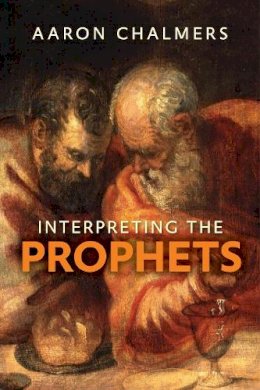In the crowded field of textbooks that introduce students to the Old Testament prophets, Aaron Chalmers has written one of the most useful yet, especially for those whose studies have a ministerial dimension. Eschewing systematic coverage of content, he offers a remarkable breadth and depth of material at quite some speed, with many supporting pictures and illustrations. The key focus...
Read moreIn the crowded field of textbooks that introduce students to the Old Testament prophets, Aaron Chalmers has written one of the most useful yet, especially for those whose studies have a ministerial dimension. Eschewing systematic coverage of content, he offers a remarkable breadth and depth of material at quite some speed, with many supporting pictures and illustrations. The key focus is on the task of facilitating interpretation. The first chapter is a lucid review of ‘what is a prophet and what is a prophetic book?’ The latter section emphasizes, rightly, that it is the text that is the primary focus of interpretation, which allows us to sit light to the limits of our historical knowledge regarding how such books were formed. The next three chapters round up three angles of approach: the historical, the theological and the rhetorical. This works extremely well. The first is a masterly overview of Israel’s history in dialogue with both the canon and external historical reference points. The second majors on Sinai and Zion traditions as a theological matrix within which to read the prophetic texts. The third is a mini-introduction to prophecy-related hermeneutics, working with the rhetorical grain of the text(s), and covering aspects of form-critical classification as well as literary characteristics. In all three chapters Chalmers offers clear examples, and pointers for further reflection by way of text boxes on specific themes. Chapter 5 explores apocalyptic, with a little more confidence that this is a separable genre than might be warranted, though Chalmers finds helpful ways to characterize apocalyptic texts. Chapter 6 then turns to ‘preaching the prophets’, with homiletical wisdom alongside caution about ‘prophecy and fulfilment’ schemas. Both these final chapters engage with refuting popular and/or conservative approaches that locate prophetic fulfilment today. In the UK I think a more common problem is simply a biblical illiteracy (even in churches) that simply does not know what to do with these texts. For revised editions I would encourage a more spacious page layout, and less text set against dark text-box backgrounds, especially when that text is often small. Pictures could be more clearly printed. Chalmers could also cite fewer specifics from other introductory books, and handle more of the issues in his own, generally elegant, prose. But I am confident that there will be revised editions, since overall this is an unusually successful textbook. The whole is a student-friendly guide that I will gladly adopt forthwith as recommended reading to accompany a course on the prophets. It is the combination of compressed introduction and the emphasis on developing tools for further interpretation that makes it work. Whereas many guides seem to imagine leisurely classes that wend their canonical way through text after text, the reality of theological education today is that Chalmers’s six chapters will probably match up to the full extent of most such courses. The book would also be an admirable refresher for those whose studies were longer ago.
Richard S. Briggs
Theology journal
This book can be recommended as a short and easily readable introduction to the prophetic books, it does not try and go through the prophets one by one or in chronological order: rather it is divided up into easily comprehensible themes that extend across all the prophetical books of the Bible. It starts by considering what is a prophet and what makes a prophetic book; reflecting on modern ‘prophets’ and prophecy elsewhere. The author then loos at their historical, theological and rhetorical backgrounds. For example, he considers who a phrase ‘cows of Bashan’ is meaningless without its historical context. The use of language by the prophets to proclaim their message and influence the hearers is well covered. The chapter on apocalyptic writings looks at the dangers of trying to apply such sayings to modern times. However, he also brings out the peril of pinning them down such that they no longer speak to us today. The last chapter – a very useful set of guidelines for preaching on the prophets – should be beneficial to all Readers.
Tim Whittle
The Reader
Read less
